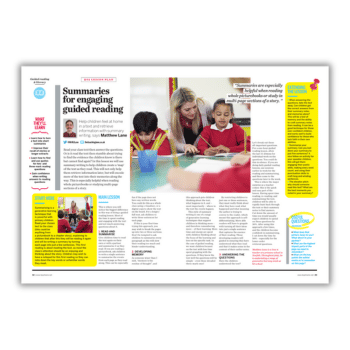Raising attainment in reading – Stop focusing on parental engagement

Focusing too heavily on parental engagement (or lack of it) in reading may be worsening the attainment gap. It’s time to move on…

- by Penny Slater

I try to avoid tweeting when riled. Having witnessed time and again the implications of an ill-conceived or poorly worded tweet, I prefer to post with caution. But, several months ago, frustrated and ill-tempered, I ignored my own advice and threw caution to the wind. I tweeted about raising attainment in reading.
Judging by the number of interactions and comments, I was not alone in this sentiment.
Many leaders and teachers responded sharing their belief that this phrase could do with booking a one-way trip to Room 101!
To be crystal clear from the outset, I am not denying there is some truth to the statement.
Raising attainment in reading
We can make the tremendously difficult job of teaching children to read, and just as importantly, to enjoy reading, a great deal easier when there is an adult at home ready and able to support, guide and enthuse.
However, we must never consider a lack of home support as a deal-breaker to securing success.
If we accept this as fact, we face a reality whereby all children who find themselves in less than advantageous circumstances are condemned to a life of poor educational outcomes. This is simply unacceptable.
Above all else, it is the futility of the statement that bothers me (hence the addition of the tongue-in-cheek GIF accompanying the tweet: a woman rolling her eyes alongside the caption ‘moving on!’).
Lack of home support
Because, when it comes to the issue of correlating underachievement in reading with lack of home support, that’s what we need to do if we want to keep raising attainment in reading; accept the unpalatable truth that support is not forthcoming and ‘move on’!
Although we may not wish to admit it, the unspoken, and most likely sub-conscious, message we convey when we utter these words is: ‘The problem here lies outside my control; until the problem ‘out there’ is fixed, there is nothing I can do!’
In saying so, we are effectively outsourcing the problem. And, in turn, denying ourselves the opportunity to explore practices that could lead to improved outcomes for these pupils.
Thankfully, our understanding of how to support struggling readers has advanced considerably in the last decade or so; there is no shortage of easily accessible, low cost, evidence-informed guidance that we can access.
With this comes the opportunity to turn the lens inwards and to focus on what lies within our control; that being the reflective and progressive advancement of our own pedagogy alongside developing a rock-steady understanding of effective inclusive practices.
Parental engagement
To return to my initial point of contention: undoubtably, having support from home brings tremendous benefit.
As such, school leaders must continue to focus on engaging all parents in their children’s learning.
This is important work.
But we should acknowledge the challenge and limitations of achieving this aim. Engaging hard-to-reach parents is time-consuming and requires heavy investment of energy and resources over a sustained period.
It also requires the collective endeavour of many stakeholders.
Change of this nature takes time and, regrettably for children at risk of falling behind, time is not on their side.
In order to do right by them, we must accept an uncomfortable truth; that despite our very best efforts, some children won’t receive that help in a timely manner. Those children should not be further disadvantaged as a result.
Put simply, a lack of home support must never be a reason for a child failing.
Instead, where home support is absent, we should recognise this as an opportunity to harness the power we have.
In this context, the phrase in my tweet becomes less of a conversation stopper, and more of a conversation starter.
Moreover, it becomes a call to action. Those around us with the authority and reach to make a change at a societal level are working hard to leverage the bigger social challenges that may prevent parents from engaging with their children’s education. And we can take solace knowing that in our classrooms, we hold the power.
When we acknowledge that, not only are we ‘moving on’, but we are empowering ourselves to make a difference.
Penny Slater is education development & partnership lead at HfL education. Follow her on Twitter @mrspennyslater










